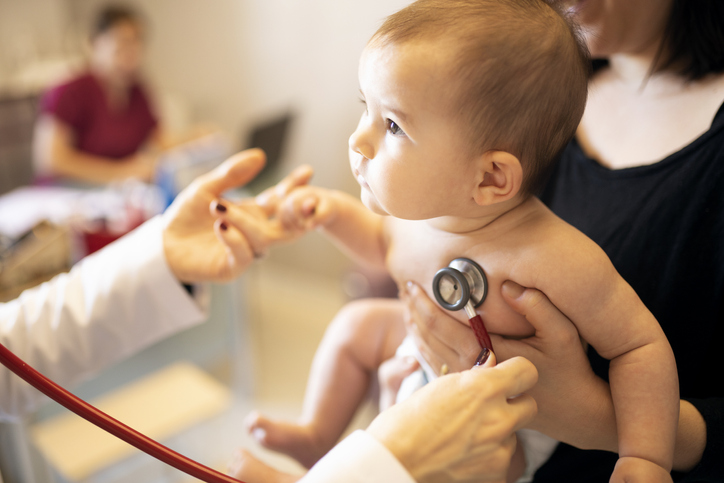Be Proactive About Nutrition Before Pregnancy. Your Child’s Heart May Depend On It

By Joy Stephenson-Laws, J.D., Founder
March is National Nutrition Month, and I think many of us would agree that the nutrition of our children is of the utmost importance. What people may not realize, however, is that women need to consume a healthy diet even before getting pregnant. Our diet before pregnancy may affect the health of our future child.
According to recent research published in Circulation, a journal from the American Heart Association, the majority of people giving birth in the United States have bad heart health before pregnancy.
(Of course, poor nutrition is one of the main culprits of poor heart health).
The study, which looked at data encompassing more than 14 million women of different ethnic backgrounds and ages (20-44) in different geographical regions who had live births, found that more than one in two women had at least one of the following risk factors for heart disease before getting pregnant:
- Being overweight or obese
- Having high blood pressure
- Having diabetes
To give you a bit more perspective, more than half of women in this age group who gave birth in the U.S. in 2019 had at least one of these risk factors before pregnancy. The most common risk factor was being overweight or obese.
Sadly, this isn’t shocking to me. Heart disease is the leading cause of death among both American men and women. The scary aspect of women having poor heart health prior to pregnancy and then becoming pregnant before improving their heart health is that it can affect their unborn children.
"Being in good health prior to pregnancy benefits the long-term health of women and their children. Poor maternal heart health is related to poor outcomes for babies at birth, such as being born early or at a smaller weight for their gestational age, and it is also linked to poor heart health later in life for these children,” said Dr. Natalie A. Cameron, who was referenced in this Medical Xpress report discussing the study.
“This connection between maternal heart health and offspring heart health, even years after pregnancy comes as a surprise to many."
Furthermore, heart disease causes more than one in four (26.5 percent) pregnancy-related deaths, according to the American Heart Association.
It is also important to note that geographic location revealed some key differences. For example, women in the South overall had poorer heart health than those in the West.
(This may very well be due to differences in built environment as well as cultural habits such as following a Southern food diet).

One of the best actions you can take for the health of your future child is to assess your health and then determine what proactive steps you need to take in order to ensure you are as healthy as possible before pregnancy. You have probably heard that it is highly advised to quit smoking and drinking alcohol if these are things you partake in, but it is also necessary to find out if you have any of those risk factors for heart disease: being overweight or obese, having high blood pressure (hypertension) or having diabetes.
Remember, being overweight or obese is the most common risk factor. If you are carrying excess weight, you likely already know this. Losing extra weight before becoming pregnant will not only help ensure a healthier child, but will also likely make the pregnancy more enjoyable and manageable and help aid in an easier delivery.
Hypertension and diabetes, however, are often conditions many Americans have without even knowing it until they are so advanced that they experience symptoms. This is why screening for these conditions is key. And to be very clear, just because you are skinny does not mean that you are not at a risk of having diabetes or high blood pressure.
“Pregnancy is nature's stress test. There are many changes in the body during pregnancy, particularly the heart, including increased blood circulation that put an extra burden on a woman's heart. Making sure you are in the best health you can be prior to getting pregnant will assure you have the best pregnancy outcomes," said Dr. Garima V. Sharma, also referenced in the Medical Xpress report.
“As part of your pre-pregnancy plan, speak to your doctor about cardiovascular disease risk factors such high blood pressure, diabetes and high cholesterol, and get these conditions under control before you become pregnant. Maintaining a balanced diet and healthy weight and not smoking or using tobacco products are also important."
Of course, not every pregnancy is planned.
Don't be discouraged.
If you are a person who desires to become pregnant as soon as possible, you may feel defeated if you discover that it is in you and your future child’s best interest to get healthier before conceiving. The good news is that if you are eager to conceive, improving your health may actually help you do so and decrease the risk of miscarriage.
According to the National Institutes of Health, being obese may make it more difficult to get pregnant. And according to this study, being obese is associated with an increased risk of first trimester and recurrent miscarriage.
Men, you are not "off the hook."
It really does take “two to tango” when it comes to making a child, and this is just as relevant when it comes to securing the health of the unborn child. If you are a man hoping to get your partner pregnant, you may want to ditch the booze six months prior. Studies have shown that the health of the father can be passed through genetic material transmitted by sperm. You can read more about this here and how, as an aspiring father, you can be in the best shape possible to make your dream of having a child come true in the healthiest manner possible.
(For all pH Labs blogs about fertility and conception, click here).
Finally I cannot stress enough the importance of routine nutrient testing. If the test reveals that you are low in iodine (for example) or any other essential vitamin or mineral, your doctor can work with you on making the necessary dietary changes and recommend quality supplements if necessary. As always, it is very important to talk to your doctor before taking any supplements or making drastic diet changes while pregnant or prior to pregnancy.
The pH professional health care team includes recognized experts from a variety of health care and related disciplines, including physicians, attorneys, nutritionists, nurses and certified fitness instructors. This team also includes the members of the pH Medical Advisory Board, which constantly monitors all pH programs, products and services. To learn more about the pH Medical Advisory Board, click here.







